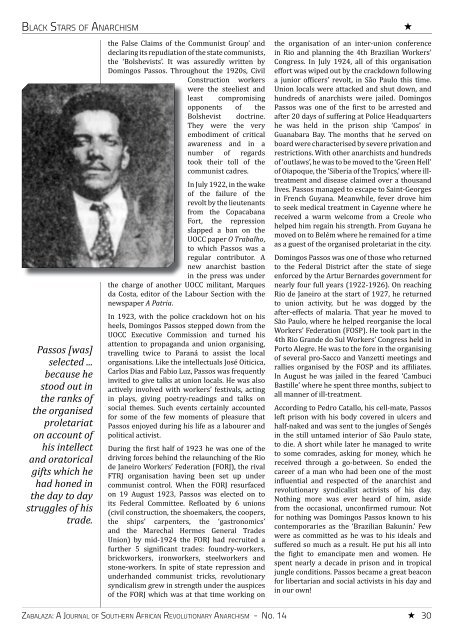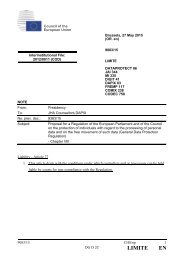[BCBMB[B
zabalaza14
zabalaza14
Create successful ePaper yourself
Turn your PDF publications into a flip-book with our unique Google optimized e-Paper software.
BLACK STARS OF ANARCHISMPassos [was]selected ...because hestood out inthe ranks ofthe organisedproletariaton account ofhis intellectand oratoricalgifts which hehad honed inthe day to daystruggles of histrade.the False Claims of the Communist Group’ anddeclaring its repudiation of the state communists,the ‘Bolshevists’. It was assuredly written byDomingos Passos. Throughout the 1920s, CivilConstruction workerswere the steeliest andleast compromisingopponents of theBolshevist doctrine.They were the veryembodiment of criticalawareness and in anumber of regardstook their toll of thecommunist cadres.In July 1922, in the wakeof the failure of therevolt by the lieutenantsfrom the CopacabanaFort, the repressionslapped a ban on theUOCC paper O Trabalho,to which Passos was aregular contributor. Anew anarchist bastionin the press was underthe charge of another UOCC militant, Marquesda Costa, editor of the Labour Section with thenewspaper A Patria.In 1923, with the police crackdown hot on hisheels, Domingos Passos stepped down from theUOCC Executive Commission and turned hisattention to propaganda and union organising,travelling twice to Paraná to assist the localorganisations. Like the intellectuals José Oiticica,Carlos Dias and Fabio Luz, Passos was frequentlyinvited to give talks at union locals. He was alsoactively involved with workers’ festivals, actingin plays, giving poetry-readings and talks onsocial themes. Such events certainly accountedfor some of the few moments of pleasure thatPassos enjoyed during his life as a labourer andpolitical activist.During the irst half of 1923 he was one of thedriving forces behind the relaunching of the Riode Janeiro Workers’ Federation (FORJ), the rivalFTRJ organisation having been set up undercommunist control. When the FORJ resurfacedon 19 August 1923, Passos was elected on toits Federal Committee. Reloated by 6 unions(civil construction, the shoemakers, the coopers,the ships’ carpenters, the ‘gastronomics’and the Marechal Hermes General TradesUnion) by mid-1924 the FORJ had recruited afurther 5 signiicant trades: foundry-workers,brickworkers, ironworkers, steelworkers andstone-workers. In spite of state repression andunderhanded communist tricks, revolutionarysyndicalism grew in strength under the auspicesof the FORJ which was at that time working onthe organisation of an inter-union conferencein Rio and planning the 4th Brazilian Workers’Congress. In July 1924, all of this organisationeffort was wiped out by the crackdown followinga junior oficers’ revolt, in São Paulo this time.Union locals were attacked and shut down, andhundreds of anarchists were jailed. DomingosPassos was one of the irst to be arrested andafter 20 days of suffering at Police Headquartershe was held in the prison ship ‘Campos’ inGuanabara Bay. The months that he served onboard were characterised by severe privation andrestrictions. With other anarchists and hundredsof ‘outlaws’, he was to be moved to the ‘Green Hell’of Oiapoque, the ‘Siberia of the Tropics,’ where illtreatmentand disease claimed over a thousandlives. Passos managed to escape to Saint-Georgesin French Guyana. Meanwhile, fever drove himto seek medical treatment in Cayenne where hereceived a warm welcome from a Creole whohelped him regain his strength. From Guyana hemoved on to Belém where he remained for a timeas a guest of the organised proletariat in the city.Domingos Passos was one of those who returnedto the Federal District after the state of siegeenforced by the Artur Bernardes government fornearly four full years (1922-1926). On reachingRio de Janeiro at the start of 1927, he returnedto union activity, but he was dogged by theafter-effects of malaria. That year he moved toSão Paulo, where he helped reorganise the localWorkers’ Federation (FOSP). He took part in the4th Rio Grande do Sul Workers’ Congress held inPorto Alegre. He was to the fore in the organisingof several pro-Sacco and Vanzetti meetings andrallies organised by the FOSP and its afiliates.In August he was jailed in the feared ‘CambuciBastille’ where he spent three months, subject toall manner of ill-treatment.According to Pedro Catallo, his cell-mate, Passosleft prison with his body covered in ulcers andhalf-naked and was sent to the jungles of Sengésin the still untamed interior of São Paulo state,to die. A short while later he managed to writeto some comrades, asking for money, which hereceived through a go-between. So ended thecareer of a man who had been one of the mostinluential and respected of the anarchist andrevolutionary syndicalist activists of his day.Nothing more was ever heard of him, asidefrom the occasional, unconirmed rumour. Notfor nothing was Domingos Passos known to hiscontemporaries as the ‘Brazilian Bakunin.’ Fewwere as committed as he was to his ideals andsuffered so much as a result. He put his all intothe ight to emancipate men and women. Hespent nearly a decade in prison and in tropicaljungle conditions. Passos became a great beaconfor libertarian and social activists in his day andin our own!ZABALAZA: A JOURNAL OF SOUTHERN AFRICAN REVOLUTIONARY ANARCHISM - No. 14 30







